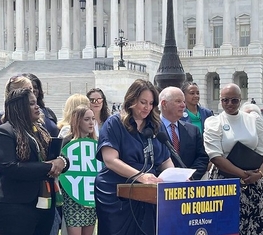DEI Success Stories: LWV of Tennessee
LWV of Tennessee created a 21-Day Racial and Social Justice Challenge to help participants understand more about diversity, equity, and inclusion and deal with race, power, privilege, and leadership.
This story was written by LWVUS intern Katelyn Pramberger
The League of Women Voters of Tennessee has been working on a 21-Day Racial and Social Justice Challenge which focuses on using audio, visual, and reading components in four topic areas, health, education, voting rights, and criminal justice, to help participants understand more about diversity, equity, and inclusion and deal with race, power, privilege, and leadership.
ACTION: Create a 21-day challenge in different topics that affect your area and spread it over a few weeks for participants to feel engaged and understand how to improve DEI in their communities.
The League of Women Voters of Tennessee took it upon themselves to work on DEI within the state League. Linda Maccabe, the second Vice President for the state League, explored different programs used around the country and was inspired by the YWCA in Cleveland, who started a 21-Day Equity Challenge where participants were given different assignments to make communities more equitable.
The LWV of Tennessee took it upon itself to expand this program into the months of January and February and broke the program into four sections: health, education, voting rights, and criminal justice. Over two weeks, members of the state League came together to discuss how they can work on ways to implement what they had worked on in their local communities. This allowed them to bring ideas to the forefront of local Leagues and instill real change. Every Saturday, members broke off into discussion groups of five or six and were given discussion questions. Because the League designed the program to cover five days' worth of material over two weeks, they made it extremely accessible for members to attend sessions. Along with this, every two weeks a different topic was discussed so if a member was unable to attend the first two weeks, they could jump right into the next two weeks easily.
The LWV of Tennessee had seminars such as “how to be an anti-racist,” where they worked on activities about racial awareness and did a module every two weeks. They also provided additional resources for people who wanted to continue discussions with open-ended questions and connect with group members.
RECOMMENDATION: Integrate a 21-day challenge over a longer period of time in order to make programs both more accessible and more enjoyable for participants.
This program was extremely successful in the League. Donations to the LWV of Tennessee Education Fund and the LWV of Tennessee increased by 94% and 17%, compared to FY 19–20. The program attracted 100 members to sign up, including state board members and people who had never previously attended state meetings.
This program further inspired LWV of Tennessee to develop a more expansive view of the programs and areas they can pursue. The League led statewide initiatives supporting voter registration for felons, working with University of Tennessee to help during the holidays, and looking at legislation to help women in prison. They also modified the concept of DEI emphasis on redistricting in communities and helping underrepresented communities.
For a League looking to follow in these footsteps, the LWV of Tennessee recommends asking a speaker to talk about topics such as inequalities in the local school system or living in diverse communities and keep discussion as a main component of programs to keep people accountable, informed, and educated. The League is now looking to work on making new mailboxes more accessible to people with physical disabilities.
By providing participants with a flexible format to focus on key DEI issue areas, the LWV of Tennessee was able to make both local and state impacts and inspire further efforts to improve Tennessee communities.
Related Content
The LWV of Ohio has been working to engage the next generation of voters, equipping them with the necessary tools to resist gender bias and demonstrating the organization’s commitment to intergenerational diversity, equity and inclusion.
Barb Clark is the Executive for Business (part of their League’s core leadership team) of the LWV of Greater Lafayette in Indiana. She shared actions taken at their board’s leadership transition meeting last year to help them identify how their League could move forward with diversity, equity and inclusion (DEI) work.
July 15-19, 2019 is National Disability Voter Registration Week. We spoke to Leagues from all over the country about the steps they are taking to empower individuals with disabilities and to create a more accessible and fair democracy for the larger communities the League serves.




